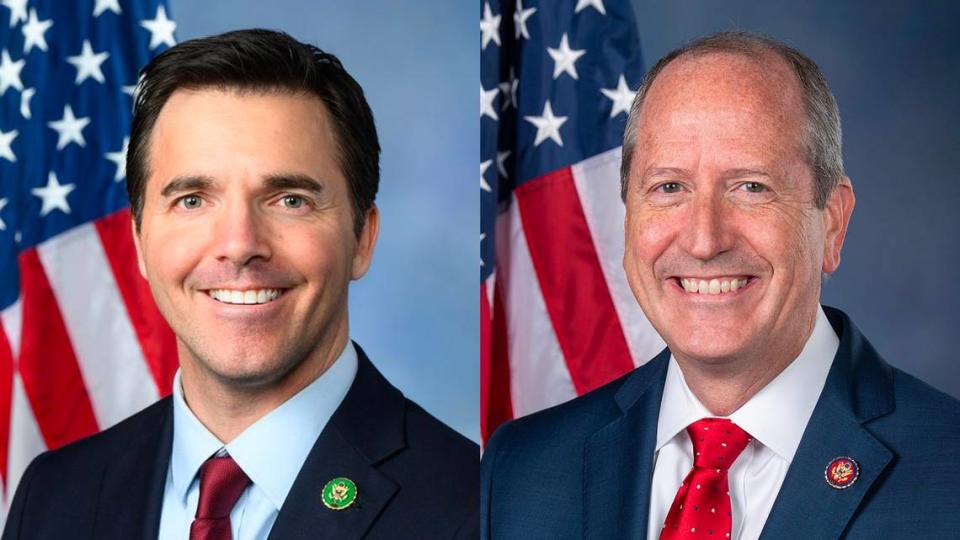Is TikTok safe to use? What NC needs to know as a potential ban advances in Congress
The U.S. House passed a bill Wednesday morning that requires a Chinese-based tech company to sell its U.S. subsidiary or face a nationwide ban.
Though talk of banning TikTok have been going on since the Trump administration, lawmakers fast-tracked this particular iteration through the House, catching TikTok’s 170 million users off guard and causing a lot of confusion about what the bill actually does.
Below is a guide on what to know about the bill.
What are the concerns about TikTok?
TikTok is owned by the Chinese-based tech company ByteDance. Members of Congress say that ByteDance is using the app to spy on U.S. citizens. Members of Congress report that China is using the app to learn the location of its users, what they search, who they know and other sensitive information.
There are growing concerns that China is using the app as a propaganda tool.
Rep. Jeff Jackson, a Democrat from Charlotte who has 2.6 million TikTok followers, shares the concerns deeply enough that he uses a second phone solely connected to TikTok so that the company can not access other information.
Does the bill ban TikTok?
Not yet. The bill asks that ByteDance sell its U.S. subsidiary within six months or face a nationwide ban.
The bill only passed the House Wednesday, meaning it still needs to go through the Senate and be signed into law by President Joe Biden before it becomes official.
Will the Senate support the bill?
It’s not yet clear. The bill hasn’t received the resounding support there that it did in the House, where it passed 352-65, with one member voting present. Another 14 House members didn’t vote at all. Many senators say they are still looking over the bill before making a decision.
Where does Biden stand?
President Joe Biden said if it passed both chambers he would sign it into law.
Biden did face some backlash, since his presidential campaign had begun using the app.
Why was this bill fast-tracked?
Intelligence and law enforcement officials held a classified briefing with members of Congress last week, leading to the bill being fast-tracked through the House.
Rep. Mike Gallagher, a Republican from Wisconsin, introduced the bill on March 5 and gathered 54 co-sponsors.
On March 7, the House Committee on Energy and Commerce unanimously sent the bill to the floor.
A second classified briefing occurred March 12.
What was learned in the classified briefings?
Well, that’s classified, but we can glean a little bit from statements members of Congress have made since.
Rep. Cathy McMorris Rodgers, a Republican from Washington state, said ByteDance CEO Shou Zi Chew lied to Congress when he said that China does not access TikTok users’ data.
She said the company is also accessing American data from other websites across the internet from people who have never even used the social media website.
McMorris Rodgers said in a committee meeting that the company is under investigation for conducting surveillance on reporters.
Rep. Raja Krishnamoorthi, a Democrat from Illinois, said when TikTok learned that the bill passed unanimously out of committee, it used geolocation data to send targeted pop-up ads telling users to call their member of Congress to stop them from passing this bill. The ads largely focused on younger users.
Phone lines saw a rush of calls from middle school students trying to stop the bill.
“On the morning of the vote, TikTok delivered a push notification and a pop up to 1000s of users across the country,” Kristnamoorthi said Wednesday morning on the House floor. “They used geolocation data targeting minor children, to then force them to call congressional offices in order to contend continuing to use the app. And in doing so, these children called and then asked the question, ‘What is Congress and what is a congressman?’ This influence campaign illustrates the need for this bill.”
What do opponents of the bill say?
North Carolina’s own Rep. Dan Bishop, a Republican from Waxhaw, is not supportive of TikTok and cautions against using it, but came out against the bill Wednesday morning, citing First Amendment rights.
“Mr. Speaker, this is not the first time that restricting speech has been pursued in the interest of national security,” Bishop said on the House floor. “I don’t use TikTok, I don’t think it’s advisable to do so. Members of this body are famous on TikTok and I think that’s unwise, but I respect the choices of 170 million users in the United States.”
Bishop was likely speaking of Jackson. Bishop and Jackson are their parties’ nominees in a race for attorney general in North Carolina.

Bishop said U.S. law gives its citizens the right to access information, including foreign propaganda, because the citizen gets to decide what to be exposed to and what ideologies to embrace and consider.
“That remains the prevailing constitutional law today,” Bishop said.
How did North Carolina lawmakers vote Wednesday?
Bishop voted against the bill. Every other House member from the state — including Jackson — voted in favor of the bill.
Jackson spoke out about his vote in favor of the bill, saying that the best-case scenario is that TikTok continues to operate, but not under partial ownership of an adversarial country.
“This bill is only the beginning of what we should be doing to reduce the harm of social media and to protect our kids online,” Jackson said in a news release following the vote. “We need new data privacy laws that will cover all social media platforms.”
NC Reality Check is an N&O series holding those in power accountable and shining a light on public issues that affect the Triangle or North Carolina. Have a suggestion for a future story? Email realitycheck@newsobserver.com


